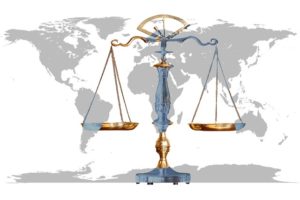September 20, 2017 • Life for Leaders
“Here is my servant, whom I uphold,
my chosen one in whom I delight;
I will put my Spirit on him,
and he will bring justice to the nations.”
Isaiah 42:1
 Isaiah 42 is the first of the so-called “Servant Songs” of Isaiah. These poetic passages speak of God’s Servant who will bring justice and salvation to Israel and beyond. Isaiah uses the word servant flexibly in these “songs.” Sometimes the Servant is clearly identified with Israel (“But now listen, Jacob, my servant, Israel, whom I have chosen,” 44:1). Sometimes the Servant seems to be another person who is sent to Israel to do God’s bidding (see 49:5-6, for example).
Isaiah 42 is the first of the so-called “Servant Songs” of Isaiah. These poetic passages speak of God’s Servant who will bring justice and salvation to Israel and beyond. Isaiah uses the word servant flexibly in these “songs.” Sometimes the Servant is clearly identified with Israel (“But now listen, Jacob, my servant, Israel, whom I have chosen,” 44:1). Sometimes the Servant seems to be another person who is sent to Israel to do God’s bidding (see 49:5-6, for example).
As Christians, we see in the “Servant Songs” a description of Jesus, who came as God’s Servant and patterned his ministry after the Servant in Isaiah. Thus, Isaiah 42:1 reveals something of the character and ministry of Jesus, who was God’s chosen one, in whom the Father was well-pleased and upon whom the Spirit descended. (See the baptism of Jesus in Mark 1:9-11, for example.)
One crucial role of the Servant is to “bring justice to the nations” (42:1). The Hebrew word translated as justice (mishpat) can refer to fairness in court, but it means much more than that. It refers to right government in a broader sense. God’s Servant will rule the nations in righteousness. He will set all things right in the world. He will cause all people to be treated justly.
Thus, when we acknowledge Jesus as the Servant of God, we also acknowledge that he brings God’s justice. We pray as he taught us, “Thy will be done on earth as it is in heaven.” We seek first the kingdom of God and his justice. And we offer ourselves in humble service to Jesus the Servant. We become servants of the Servant, ready to do his will on earth.
Therefore, as followers of Jesus the servant, we are those who, in the words of the prophet Micah, “act justly” (Micah 6:8). We do this in every facet of life, in our families and our workplaces, in our communities and our churches. Moreover, when we see injustice in the world, when we see racism or oppression, violence or abuse, we name what is evil and promote what is good and godly. We become agents of God’s justice because we are followers of God’s Servant.
QUESTIONS TO CONSIDER:
When you think of Jesus as the Servant of God, what ideas and images come to mind?
What connections do you see between the justice of God and the ministry of Jesus?
How do you live as a servant of the Servant?
In what ways are you seeking the justice of God in your life? Might God be calling you to do something more?
PRAYER:
Gracious Lord Jesus, today I honor you as the Servant of God. You were sent by the Father to bring justice to the nations. Yes, you judged the sin of all nations, yet you took that judgment upon yourself when you died on the cross. Thus, the justice you bring isn’t condemnation but restoration. You have come to make things right and to rule over this world with divine justice.
Even as I recognize you today as the justice-bringing Servant of God, I offer myself to you again. I am your servant. My life belongs to you and is dedicated to your purposes. So rule over me, Lord. Use me in your work of bringing justice to this world. May I be an implement of your justice in every facet of my life, for your glory. Amen.
Explore more at the Theology of Work Project online commentary: Waiting Under the Apple Tree

Dr. Mark D. Roberts is a Senior Strategist for Fuller’s Max De Pree Center for Leadership, where he focuses on the spiritual development and thriving of leaders. He is the principal writer of the daily devotional, Life for Leaders, and the founder of the De Pree Center’s Flourishing in the Third Third of Life Initiative. Previously, Mark was the Executive Director of the De Pree Center, the lead pastor of a church in Southern California, and the Senior Director of Laity Lodge in Texas. He has written eight books, dozens of articles, and over 2,500 devotions that help people discover the difference God makes in their daily life and leadership. With a Ph.D. in New Testament from Harvard, Mark teaches at Fuller Seminary, most recently in his D.Min. cohort on “Faith, Work, Economics, and Vocation.” Mark is married to Linda, a marriage and family counselor, spiritual director, and executive coach. Their two grown children are educators on the high school and college level.




